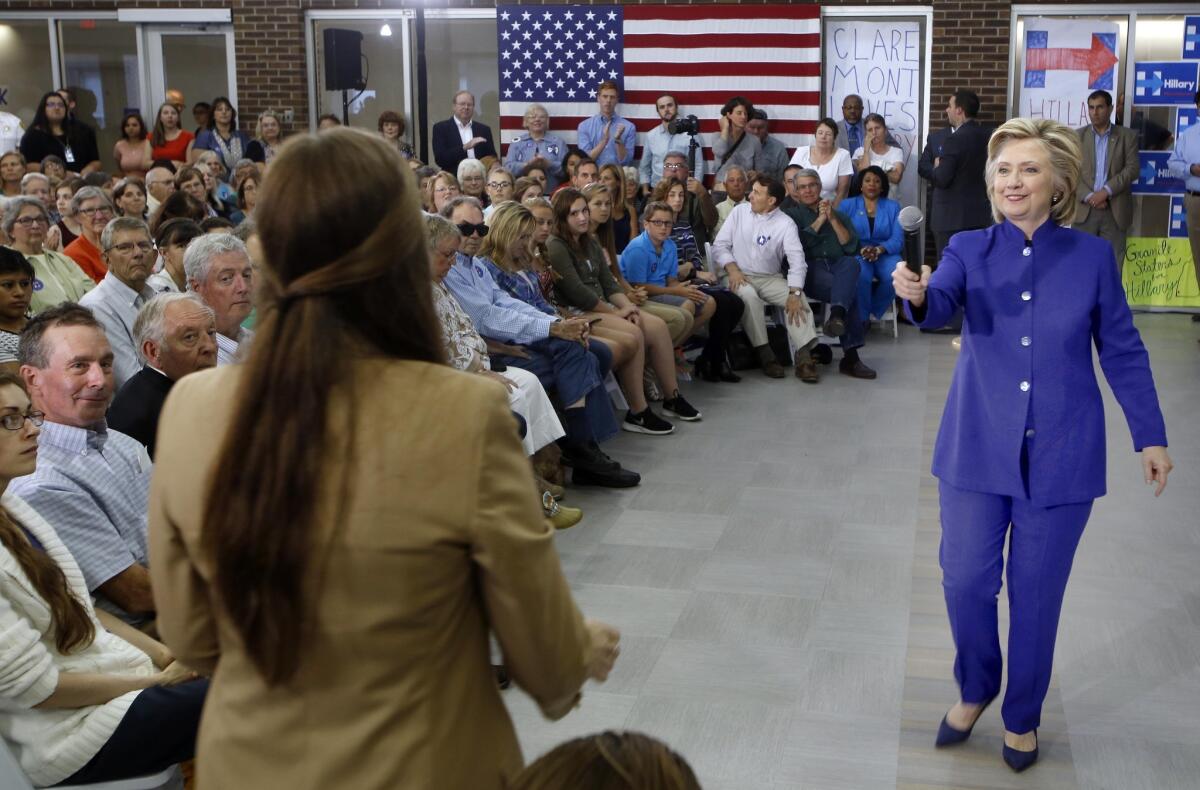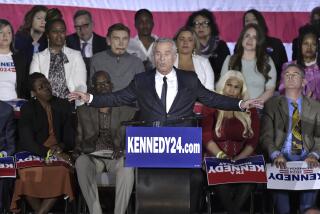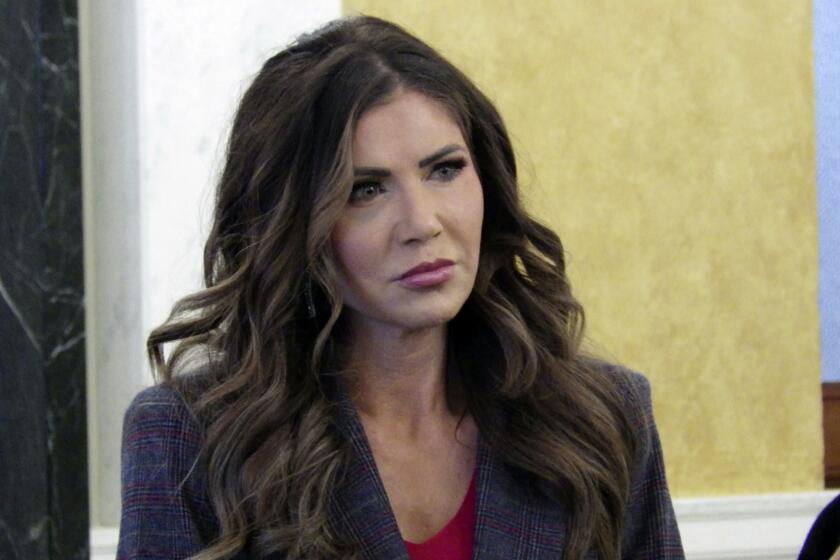Column: Can Hillary Clinton win the angry voters?

Democratic presidential candidate Hillary Rodham Clinton takes a question during a campaign stop at River Valley Community College Tuesday, Aug. 11, in Claremont, N.H.
While Donald Trump has kept the political world transfixed, Hillary Rodham Clinton has spent her summer methodically rolling out a long list of policy proposals. They add up to a platform you might call “soft populism.” It’s not the insurrectionist socialism of Bernie Sanders but still progressive enough to keep most Democratic primary voters on her side.
Clinton has offered talking points on economic growth, income stagnation, small business, college costs, immigration, criminal justice reform, climate change — and a few other things beside.
But there’s one big item missing from her agenda so far, a wonky but important issue that Democrats neglect at their peril: reforming the federal government. Or, to borrow a slogan from the Democrats’ 1992 presidential candidate, Bill Clinton: “reinventing government.”
It’s no mystery why voters are in an angry mood this year. Like Trump and Sanders, many of them believe the political system is broken and the government doesn’t work. A Pew Research Center poll found last year that only 24% of Americans trust the federal government to do the right thing most of the time.
Clinton agrees, at least in principle. “Our political system is so paralyzed by gridlock and dysfunction that most Americans have lost confidence that anything can actually get done,” she said when she announced her candidacy in June.
She also said she wanted to make the federal bureaucracy “smarter, simpler [and] more efficient.” But that’s the last time she talked about government reform. A long memo to supporters last week from her campaign manager, Robby Mook, didn’t mention the topic at all.
Meanwhile, in her policy speeches, Clinton has talked up an activist role for the federal government: creating jobs through infrastructure spending, shaping corporate behavior through tax incentives, revamping the college loan system, funding preschool education.
Those ideas should all play well in a Democratic primary campaign. But to win a general election, a Democrat also needs to convince less-partisan voters that the federal government is capable of spending their tax money wisely, or that it can be made to by a determined president.
Skeptical voters, especially white working-class ones, “are open to an expansive Democratic economic agenda — to more benefits for child care and higher education, to tax hikes on the wealthy, to investment in infrastructure spending,” Stanley B. Greenberg, chief pollster for the 1992 Clinton campaign, wrote in a recent memo for the Democratic Strategist. “Yet they are only ready to listen when they think that Democrats understand their deeply held belief that politics has been corrupted and government has failed,” he warned. “Everything they have seen says that government is gridlocked and is bought and paid for by big donors and special interests.... Championing reform of government and the political process is the price of admission with these voters.”
Greenberg has urged Clinton and other Democrats to talk about streamlining the federal government even before they talk about new programs — “reform first.”
“When voters hear the reform narrative first, they are then dramatically more open to … calls for government activism in response to America’s problems,” he wrote.
But so far, Clinton is doing the opposite. She’s rolling out big-government proposals first and leaving the wonky stuff of government reform for later.
There’s also a substantive reason to embrace government reform, of course: It’s good policy.
The federal government hasn’t undergone a full-scale overhaul since Bill Clinton launched his “reinventing government” crusade 22 years ago. His successors, George W. Bush and Barack Obama, didn’t abandon government reform, but they never made it a high-priority goal, and it showed. Some of Obama’s worst moments as president have resulted from his administration’s neglect of the workaday machinery of government: the collapse of the Obamacare website in 2013, the scandal over mismanagement of Veterans Affairs hospitals in 2014.
“This needs to stay on her list,” argued William A. Galston of the Brookings Institution, another veteran of the first Clinton administration. “The voting public doesn’t think the U.S. government is working very well, and the voting public is right.”
Galston said Clinton could begin by proposing broad-scale regulatory reform, to steal a favorite issue from Republicans, and an effort to unsnarl the federal government’s byzantine contracting rules.
“When the Obamacare website was being built, the federal government didn’t have access to some of the best firms because its contracting practices are so cumbersome,” Galston noted. “That’s one of the reasons several states performed so much better.”
Or she could go big — and propose a 21st century version of her husband’s ambitious attempt to make the federal government innovative, agile and customer-friendly.
The Democratic front-runner already has all the disadvantages of running for office as a Clinton, from controversies over foreign donations to the Clinton Foundation to the consequences of her ill-advised decision to store official emails on a private server. She might as well take advantage of the successful parts of her husband’s legacy too.
Twitter: @doylemcmanus
Follow the Opinion section on Twitter @latimesopinion and Facebook
More to Read
A cure for the common opinion
Get thought-provoking perspectives with our weekly newsletter.
You may occasionally receive promotional content from the Los Angeles Times.







